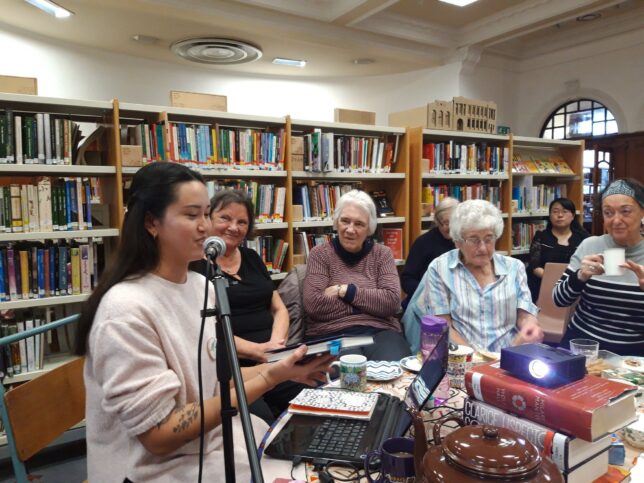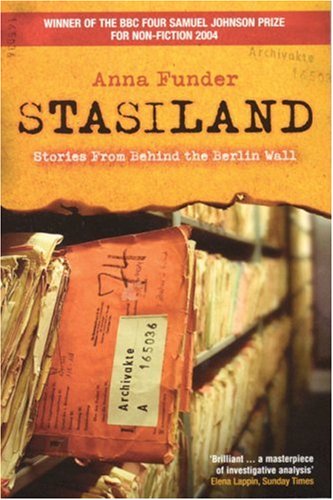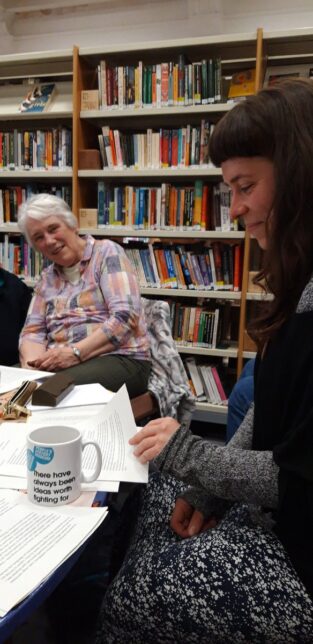Aaah Story Café…from the insightful, generous chat, to the big brown teapot, it’s a magical thing to be part of. With our 30th anniversary celebrations well under way, I’ll be reflecting on some of my personal highlights from our long-running and beloved group.
To kick off 2023 and shake off those January blues, I’m looking back on some of the international placement students we’ve welcomed. By sharing writers that they love, they opened up the world to us, sparking wonderful insights and conversations. We learned so much from them.
Instagram poets
Celestine, on placement from Switzerland, shared her love of Instagram poet Rupi Kaur and beguiled us with fairy tales by Nikita Gill, reading aloud to us in both English and French. It was wonderful to share our thoughts on writers who are totally new to us – ‘I feel invigorated by hearing a fresh perspective!’, ‘Rupi’s poems make me feel included’

Crossing Borders
Pauline, on placement from Germany, explored what life was like for people in East/West Germany, and all the complexities that still exist today as a result of a country being partitioned. She introduced us to the novel West by Julia Franke and Stasiland by Anna Funder. ‘One of the best events at Story Cafe…Pauline’s insight was fascinating‘. By chance, this was the day we were filmed for Museum of the Year, so it was lovely to see our beautiful Story Café circle feature in the film.

Greek poets
Zefi, on placement from Greece, delighted us with her passion for darkly compelling speculative fiction, and translated some poetry from Greek women writers that we would otherwise never have been able to hear.
Trailblazing Spanish writers
Laura, on placement from Spain, shared her brilliant research into her favourite Spanish feminist writers, as we enjoyed delicious Spanish food! From journalist and activist Carmen de Burgos, to political writer María Zambrano Alarcón, there were some incredible, trail-blazing women for us to discover. You can find out more about Laura’s research and placement here

And finally…Italian anti-facist resistance fighters…
It was an absolute treat to welcome Lili, who painstakingly translated works by two Italian authors, especially for us. Our hearts were in our mouths as we listened to thrilling extracts from the memoir of anti-fascist, partisan resistance fighter Lidia Menapace. Lili also read us an extract from novel by Selma Mahlknecht. I recently caught up with Lili, and she kindly shared some reflections about her time at Story Café…
“In April 2019, I had the pleasure to share a few excerpts from Selma Mahlknecht’s In the Cocoon and Lidia Menapace’s I, the Partisan: My Resistance at Story Café. These books were written in German and Italian originally, and to my knowledge they haven’t been translated into English yet. Story Café was a great opportunity to share a few pages from books that most GWL users wouldn’t have come across otherwise, so I translated some of the most touching/interesting/funny parts of the books.
Selma Mahlknecht used to be my teacher at secondary school. She is without any doubt one of the most inspiring teachers I’ve ever had, a walking encyclopaedia, kind, hilarious, and a staunch feminist. I translated some passages about a 13-year-old girl trying to deal with the intense and often contradictory emotions coming with puberty.
Lidia Menapace got involved in the resistance movement against Italy’s fascist regime and the Nazi occupation of northern Italy in the 1940s. The rest of her life was filled with politics and writing, and in her old age she became something like a moral authority. She passed away in 2020.
In her autobiographical account of the resistance movement, she writes:
As a staffetta [helper] I went up and down the valleys, I went to houses, farms, mountain huts and dropped off clandestine papers, brought messages, either written or memorised ones, medical supplies for the wounded, sometimes plastic and other materials for attacks on bridges or rails. I kept saying that I had cycled so many kilometres that I would have signed up to the Giro d’Italia [equivalent of Tour de France] after the end of the war – I would have only got the black t-shirt, but I would have made it through to the end of the race.…
One question related to the resistance movement which has not been solved is the one on the acknowledgement of the role of women. This chapter hasn’t been closed yet, partly because I think there wasn’t one single way of being active in the resistance, not for the men either: and also among us women were those who were more politicised, those who followed their husbands, boyfriends, brothers, those who were looking for personal liberation all the way up to bearing arms, and those who wanted to demonstrate their willingness to exercise their full civic duties. […]
What continues to irritate me is the embarrassment and the judgement of the leadership of the resistance. We know that when the big rally was organised in Milan after we had been liberated, Boldrini and Parri [male partisan leaders] and many others didn’t allow women to take part in it. Togliatti [male partisan leader] said that it was better for women not to be part of the rally because ‘the people wouldn’t have understood’, a phrase which is frequently used to stop women from doing things. What precisely it was that was supposedly so difficult to understand, I don’t know… I’m convinced that the leaders of the resistance simply didn’t want to share their power and representation with the women and claimed it all for themselves. Under such conditions, we weren’t off to a good start.
Story Café weaves its magic through sharing – of stories, poems and experiences. It’s been immeasurably enriched by all the hard work, enthusiasm, joy and passion that our placement students bring along. Thank you all x

Comments are closed.